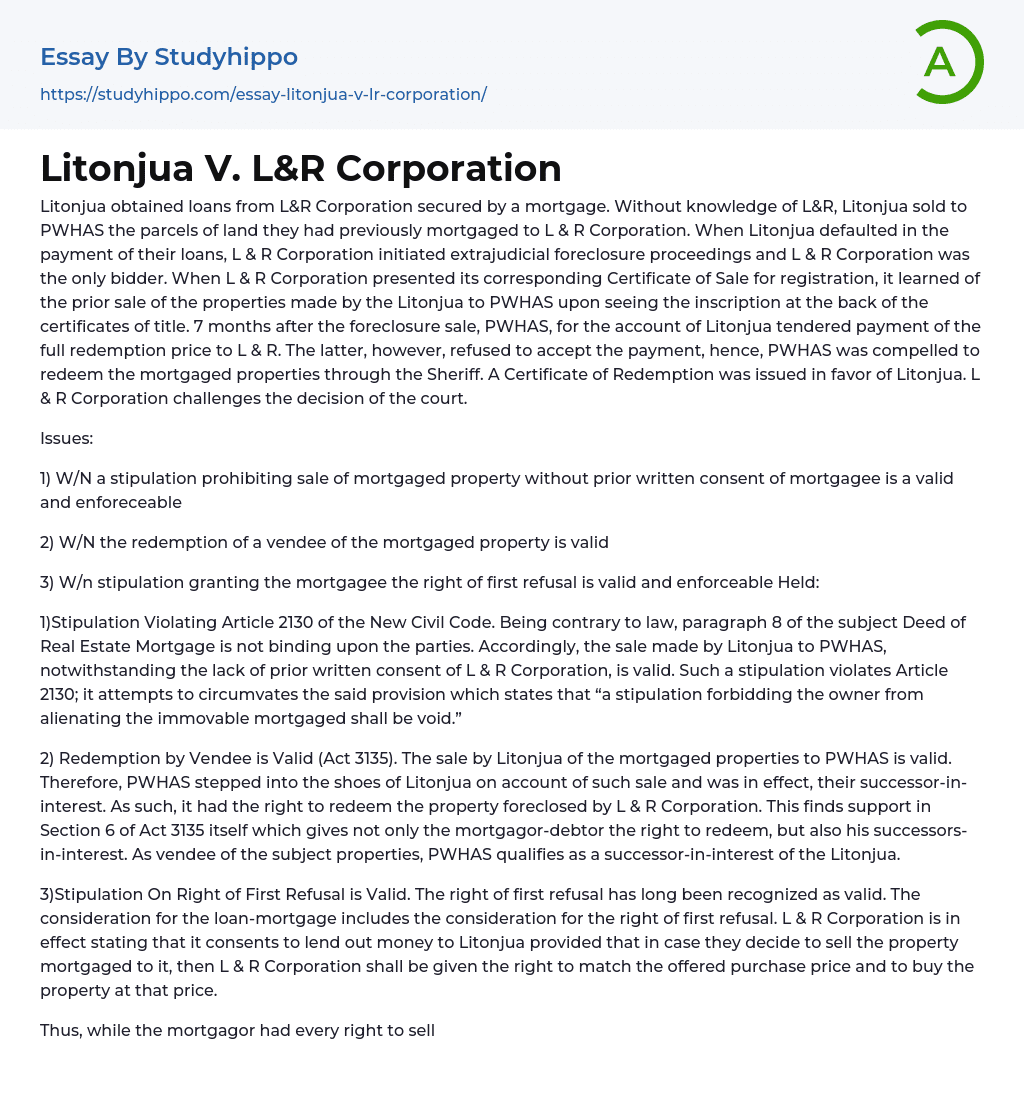Litonjua borrowed money from L&R Corporation and used their property as collateral. Without L&R's knowledge, Litonjua sold the land to PWHAS. When Litonjua failed to make loan payments, L;R initiated foreclosure proceedings and became the only bidder. However, when L;R tried to register their Certificate of Sale, they found that Litonjua had already sold the property to PWHAS. Seven months after the foreclosure sale, PWHAS attempted to pay the redemption price to L;R but were denied. Consequently, PWHAS had to redeem the property through the Sheriff which resulted in a Certificate of Redemption being issued in favor of Litonjua. Currently, L;R Corporation is challenging the court's decision.
Problems:
The validity and enforceability of a stipulation that prohibits the sale of mortgaged property without the prior written consent of the mortgagee.
align: justify">2) Does the purchaser consider the redemption of the mortgaged property to be valid?
The court determined that a stipulation, which grants the mortgagee the right of first refusal, is both valid and enforceable.
1) The Deed of Real Estate Mortgage's paragraph 8 stipulation is not binding because it violates Article 2130 of the New Civil Code. This provision declares void any stipulation that prohibits the owner from selling the mortgaged property. Thus, Litonjua's sale to PWHAS remains valid even without L & R Corporation's prior written consent.
2) Redemption by Vendee is Valid (Act 3135). The sale made by Litonjua of the properties that were used as collateral to PWHAS is valid. Therefore, PWHAS took over the rights and responsibilities of Litonjua due to this sale and essentially became their successor-in-interest. Consequently, PWHAS has the right
to redeem the property that was foreclosed by L ; R Corporation. Section 6 of Act 3135 supports this argument as it grants not only the original debtor the right to redeem, but also their successors-in-interest. PWHAS, being the buyer of the mentioned properties, meets the requirements to be considered Litonjua's successor-in-interest.
3) The validity of the Stipulation On Right of First Refusal has been acknowledged for a long time. The loan-mortgage agreement includes the consideration for this right. L & R Corporation is essentially stating that it consents to lending money to Litonjua under the condition that if they choose to sell the mortgaged property, L & R Corporation will have the right to match the offered purchase price and purchase the property at that price.
In summary, the mortgagor is allowed to sell their property that has a mortgage without needing permission from the mortgagee. However, they must inform the mortgagee and give them the first opportunity to purchase the property before considering other buyers. The mortgagee can only refuse this offer and allow the mortgagor to sell to others if they choose not to exercise their right of first refusal.
PWHAS is not able to claim that they were unaware of L & R Corporation's right of first refusal over the properties in question. This provision was included in the Deed of Real Estate Mortgage and properly registered with the Register of Deeds. As a result, PWHAS can be assumed to have been informed about this provision through registration, which serves as notice to everyone. However, it cannot be held against L;R that they did not exercise their right
of first refusal promptly because Litonjua did not inform them about their intention to sell the property and prioritize L;R over other potential buyers.
The mortgagee's right of first refusal being taken away leads to the cancellation of the sale made to other purchasers. In short, the sale between Litonjua and PWHAS remains legitimate even without prior written consent from L & R Corporation. PWHAS, as successor-in-interest of Litonjua, presented a valid offer to redeem and provided the redemption price within one year. Nonetheless, despite the validity of the sale, it can be revoked due to disregarding L & R Corporation's right of first refusal.
- Company essays
- General Motors essays
- Bmw essays
- Ford Motor Company essays
- Honda essays
- Toyota essays
- Volkswagen essays
- Amazon essays
- Apple essays
- Enron essays
- Tesco essays
- Ibm essays
- Costco essays
- Kellogg essays
- Ikea essays
- Iphone essays
- Supermarket essays
- Gap essays
- Walmart essays
- Adidas essays
- Red Bull essays
- Pepsi essays
- Coca-Cola essays
- Burger King essays
- Kfc essays
- Mcdonald's essays
- Key essays
- British Airways essays
- Nokia essays
- Facebook essays
- Myspace essays
- Twitter essays
- Google essays
- Microsoft essays
- Ryanair essays
- Southwest Airlines essays
- Johnson and Johnson essays
- Sony essays
- Ebay essays
- Pepsico essays
- Starbucks essays
- Dell essays
- Intel essays
- Nestle essays
- Netflix essays
- Nike essays
- Samsung essays
- Bankruptcy essays
- Earnings essays
- Tata Group essays




